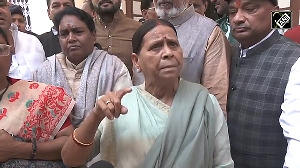Hired helps for others' big-budget animation projects for long, they're now ready to team up with international production houses for a whack at their own ideas.
RichCrest Animation Studio, the US-based subsidiary of Crest Animation Studio of India, has signed a co-production and co-finance arrangement with Lions Gate Entertainment (of Crash fame) to produce three animated films. RichCrest will outsource all animation work to Crest's Indian studio. But for the rest, it's a joint effort.
"Both RichCrest Animation and Lions Gate Entertainment will co-share investments, intellectual property rights and profits 50:50," says A K Madhavan, CEO, Crest Animation Studios. Sylvester and the Magic Pebble (90 minutes) would be the first out, followed by two others.
"The first project would be between $70-90 million in the US, but with animation production done in India, it would cost around $25-30 million," says Madhavan.
The global distribution and spin-off management (sequels, video games, television serials and merchandising), though, would be Lions Gate's job, except in India.
Other such deals are being struck too. DQ Entertainment, for example, has 32 projects under execution, mostly animation co-productions for global consumption.
Color Chips India, meanwhile, is co-producing an animated television series, Legend of the Dragon, with US-based BKN Productions, Kiki and France-based Benz Productions. Its other treaty involves doing graphics of a feature film with Film Valley Productions of Canada, with investments and revenue shared for the graphics part.
"We either part finance a project (5-35 per cent) of X amount with treaties like services included along with territory rights and revenue shared, or fully finance production costs with our partners," says Sudhish Rambhotla, managing director, Color Chips India, who estimates that a television series costs $10 million.
"Co-production with international production houses is an absolutely necessary step. It's a sign of the industry's growth, maturity and confidence by foreign productions in our ideas, business and management skills and not just labour," says Atul Rao, CEO, Toonz Animation Studio, which is also in the co-production arena for a series with US-based Marvel Productions.
Toonz would share revenues of the $350,000 project, as also the broadcast rights (Europe & Asia) and merchandising rights for India.
Most deals assume myriad forms, explains Rao, sometimes with the service fee accounting for the Indian partner's investment. The foreign partner typically has market access as the big bargaining chip.
The key issue, of course, is ownership of intellectual property - and Indian firms are wrangling themselves at least some of the rights. The emphasis is on "sharing"; as local animation studios increasingly get to be equity partners in projects, rather than service-providers, expect an increasing contribution of creative resources as well.
Yet, Rao's enthusiasm is not shared wholly by many other studios. Chetan Desai, creative director, Maya Entertainment, will probably venture into co-production, but would rather play safe for now.
"A one-off co-produced project does no good," he says, "only continuous projects keep the money rolling."
Even V G Samant, director of Hanuman, currently busy with Hanuman 2, is wary of co-production deals. "International studios will definitely approach Indian studios for co-production treaties as total production costs will be lower," he says, but the risks may still be too steep.
Nevertheless, deals are being scouted for and signed. Nasscom places the Indian animation industry at $1.5 billion in 2010. Tapaas Chakravarti, CEO, DQ Entertainment foresees, "India as the number one hub for animation in the world, overtaking South Korea in a matter of two-three years".
The talent story is good, no doubt. It's just that care must be taken that valuable intellectual property does not slip away too cheap.
Want to discuss computer software? Join the Computer software Discussion Group







 © 2025
© 2025